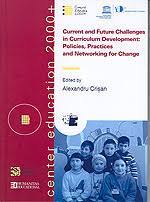
Current and Future Challenges in Curriculum Development: Policies, Practices and Networking for Change
- Crisan Alexandru
- 2006
- Humanitas educațional
- 10-973-1715-04-5
Several studies focus on main challenges that countries addressed in comprehensive cases of curriculum change
and improvement, as well as on curriculum processes and issues of curriculum management in the situation of
large-scale reforms (Alexandru CRISAN: Romania; Mari BOGNÁR: Hungary; Irmeli HALINEN: Finland; Virginija
BŪDIENÉ: Lithuania). An overview of European education and curriculum policies is provided by Gabi HOSTENS,
who talks about current strategies and debates at the European Union level relevant for member states, such as
key-competencies for life-long learning in a knowledge society, the need of targeting clear objectives of education
and training systems, and the so-called ‘Open Method of Coordination’ (OMC: monitoring implementation
progress towards the strategic objective).
Some other studies discuss the impact international developments in knowledge, economy, culture and social life
have on curriculum work worldwide. Carmen CRETU explores the concept of a ‘global curriculum’ while Mihaela
SINGER delves into identifying relationships between cognitive models and competence-based curricula for
secondary education. Grzegorz MAZURKIEWICZ tackles gender issues in textbooks and class activities with
reference to Poland, and Dakmara GEORGESCU discusses the need for ‘reflective’ curriculum development based
on balancing uprightly ‘old’ and ‘new’ aspects in education and learning, and – expectantly – overcoming onesided views and approaches.
The issue of translating policies into practice though sustainable implementation is treated in several other
contributions (Nicola PASTUHOVIC: Croatia; Simon JANASHIA: Georgia; DJADRINA MAKPAL: Kazakhstan;
Nadejda VELISCO: Moldova; Srdjan PERIĆ: Montenegro; Firuta TACEA: Romania; Emin KARIP: Turkey; Sergiy
KLEPKO: Ukraine).
The book advocates for international exchanges and sharing that can inform sound links between curriculum
theory, policies and practices. While copying ‘curriculum models’ from other countries might be a risky endeavour,
it is nevertheless necessary and useful that policy makers and curriculum developers engage in ‘reflective’
debates on international cases, practices and comparative aspects in order to reach informed decisions.
• Carmen - Mihaela CREŢU
